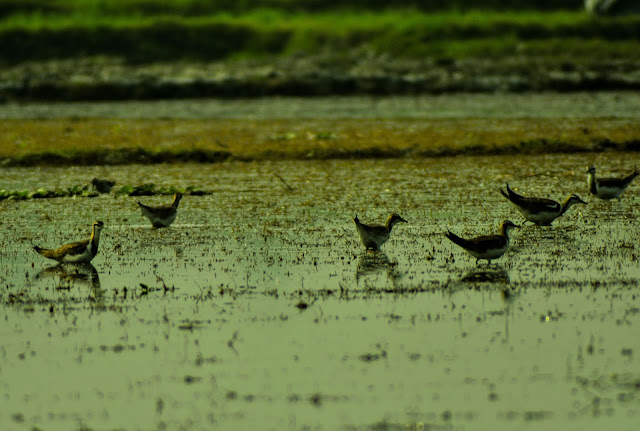Ox-bow lakes have always managed to occupy a large portion of our Geography syllabi way back in our school days. It’s true that the geography text books never quite induced the magic associated with them. And maybe that’s why when Purbasthali welcomes you with her extensive wetlands, you can’t help but be awestruck by the sheer volume of life that a marshy ecosystem sustains every moment.
A long, long time ago, the mighty river Ganges decided to
change her course(during one of her whims, I suppose) while flowing through the
plains of Bengal. At a place known as Chupi Chor(or Purbasthali) located in the
heart of the Kalna Subdivisional town of Burdwan district, Ganga formed an ox
bow lake and started flowing in an altered course. The rich fertile soil of
that region coupled with the moribund waters of the holy Ganges developed a
unique ecosystem that blooms with life every moment. And when life blooms in
full swing, the winged species are quick to call it their homes. Some prefer to
call it their own home, while for others it serves as a winter retreat from the
icy cold climate of Siberia.
Purbasthali plays host to a multitude of winged species,
both migratory and residential, attracting them with its offerings of food,
shelter and a promise of security from those who threaten their very existence.
Once-upon-a-time-poachers-turned-into-conservationists have helped develop Purbasthali into one of the best birding destinations in West Bengal. Located
at a distance of 160kms from Kolkata, Purbasthali is very well connected
through a network of state and national highways. Its nearest railhead is
Purbasthali station (PSAE) which lies on the Burdwan-Katwa line. Local transit
option is limited to electric ‘Toto’s which are quite inexpensive and fun to
ride.
The first view of the beautiful marshes can be best experienced
from the lone watchtower adjoining the boating ‘ghat’. It offers 360 degrees of
unobstructed field of vision and helps to create a broad map of the region in
your mind. The boatmen start to arrive at the Ghats from early morning. All of
these boats are hand propelled and the boatmen usually charge Rs.150/hour for a
boat. The entire stretch of the ox bow lake can be covered in 5-6 hours.
As the boat starts meandering through the lively moorlands,
a Kingfisher suddenly shoots past you, breaks the water surface and comes up
with a prized catch! You are most welcome to watch him have his breakfast
perched on a tree branch. Sometimes they aren’t that lucky because if it’s a
puffed fish, they have to wait for the air inside the fish to get released
before they can actually gulp it down. Wonderful, isn’t it?
Now that you have seen the common blue Kingfisher, it’s time
to feast your eyes on a large group of pheasant tailed ‘Jacana’s who are busy
figuring out their day’s menu in the marshes. The pheasant tailed Jacana and
the bronze winged Jacana are easy to spot in these marshes thanks to their
striking plumage. They are mostly found in portions of South-East Asia.
If you can manage to turn away from them, a small Pratincole
gets ready to grab your attention. They are common in parts of Burma, Cambodia,
Thailand and are widely regarded as long distance migrants. Their unmistakable
chubbiness coupled with bright sparkling eyes make them endearing to bird
lovers and humans alike! But don’t let their cuteness deceive you even for a
moment. They can take off and change their flying direction at the drop of a
pin, just like Swallows.
As the boat continues its journey towards the Ganges, a Purple Heron waits patiently for a catch. This member of the heronry usually breeds in Europe, Asia and Africa. Once it has located its prey, the majestic flight takes place, as if in slow motion.
The hand powered boats help to keep the silence of the marshes intact and allows people to get up close and personal with the feathered visitors. And if you get too close, the birds suddenly start their flight and leave behind long lasting ripples on the otherwise placid water. The most easily disturbed ones are the flocks of pochards who take off instantly.
If left undisturbed, they spend hours and hours, bobbing up and down with the small ripples in a particularly joyous and peaceful rhythm. Like this flock, right here.
Occasionally you will find flocks of Ibis flying overhead and searching for places to sit and brood over life's complexities. They are extremely picky about calling a stretch of marsh, their own. Against a deep blue sky, the Ibis spread their wings and inspire people to dream of conquering new heights.
The calm, stagnant waters teeming with millions of insects and bird feed help bring the winged creatures extremely close to us each year. And we as responsible human beings should keep our part of the deal by ensuring their safety and wholehearted existence on the marshes. Their happy cacophony should be the only form of reward that we can hope to receive in the years to come. And every time we decide to get lost in their calls, a new birdie breaks out of the protective egg shell of the mother bird and looks up to the sky with the dream of spreading her tiny wings and exploring the great beyond. Let's help her to realize that dream :)

This picture was clicked with our boatman Jayanta da!

And here's to the bulls which keep us on the road and bring us back home safely :) Thank you Royal Enfield !

























No comments:
Post a Comment